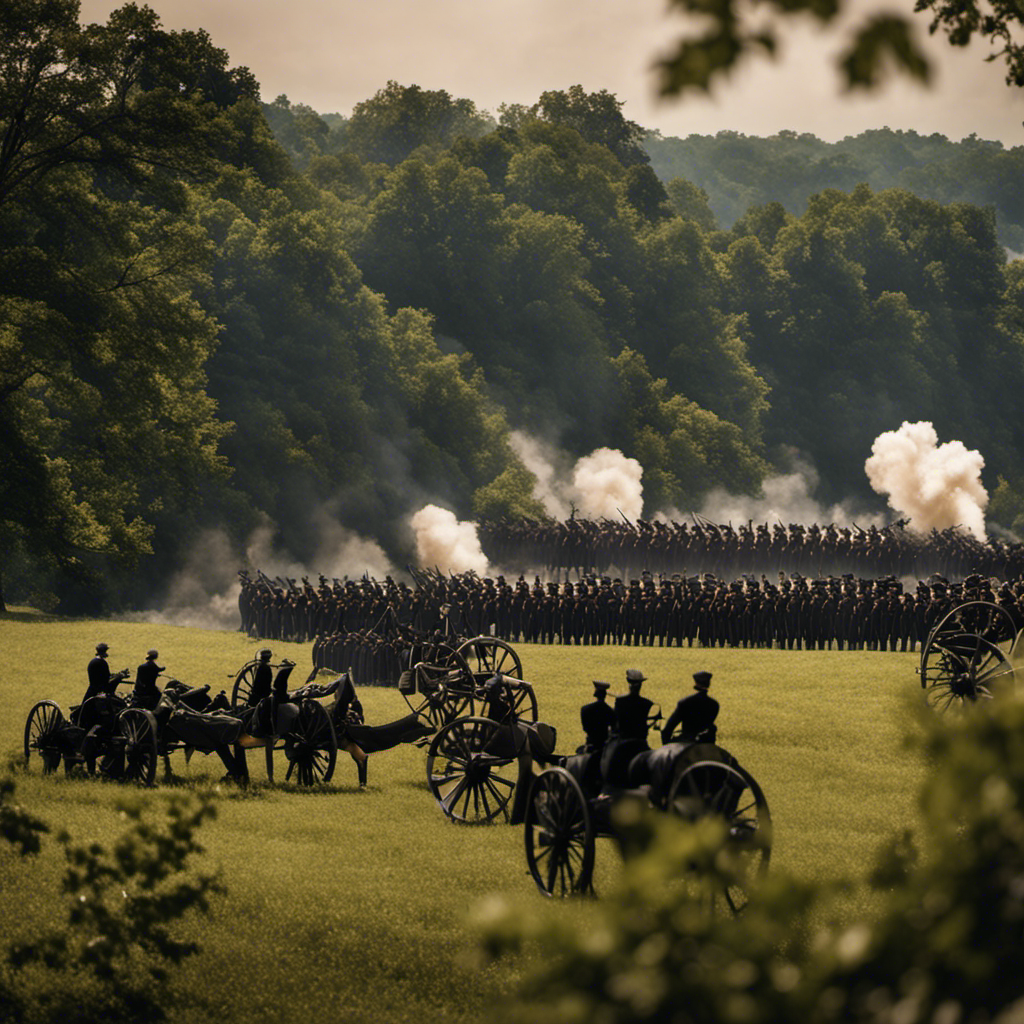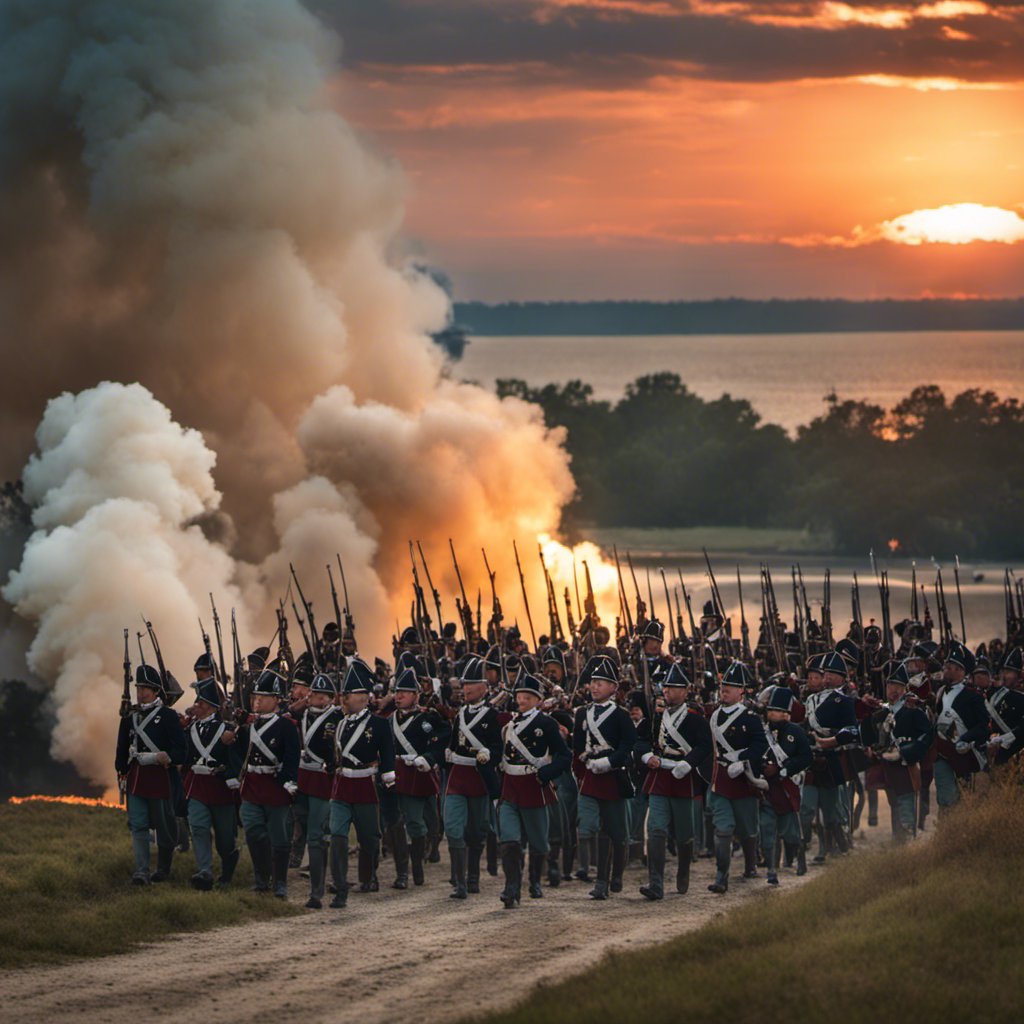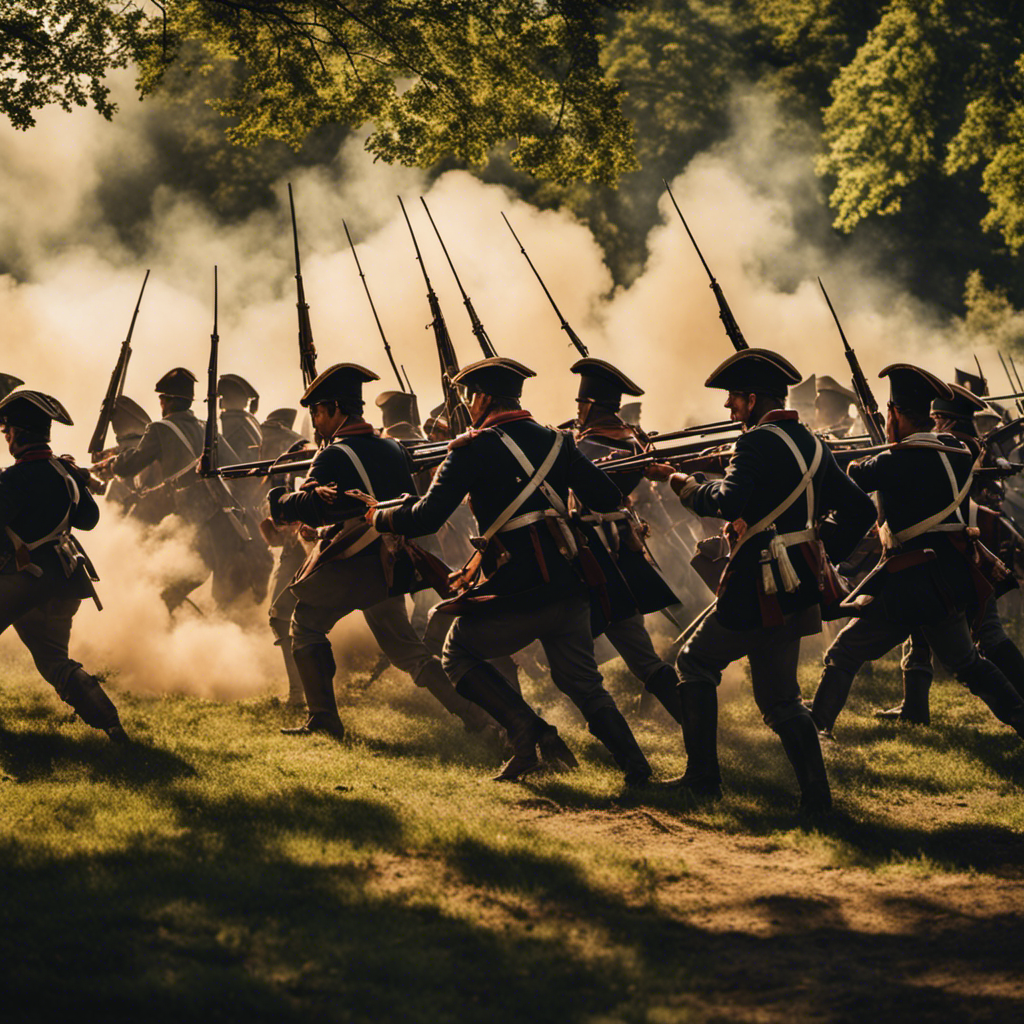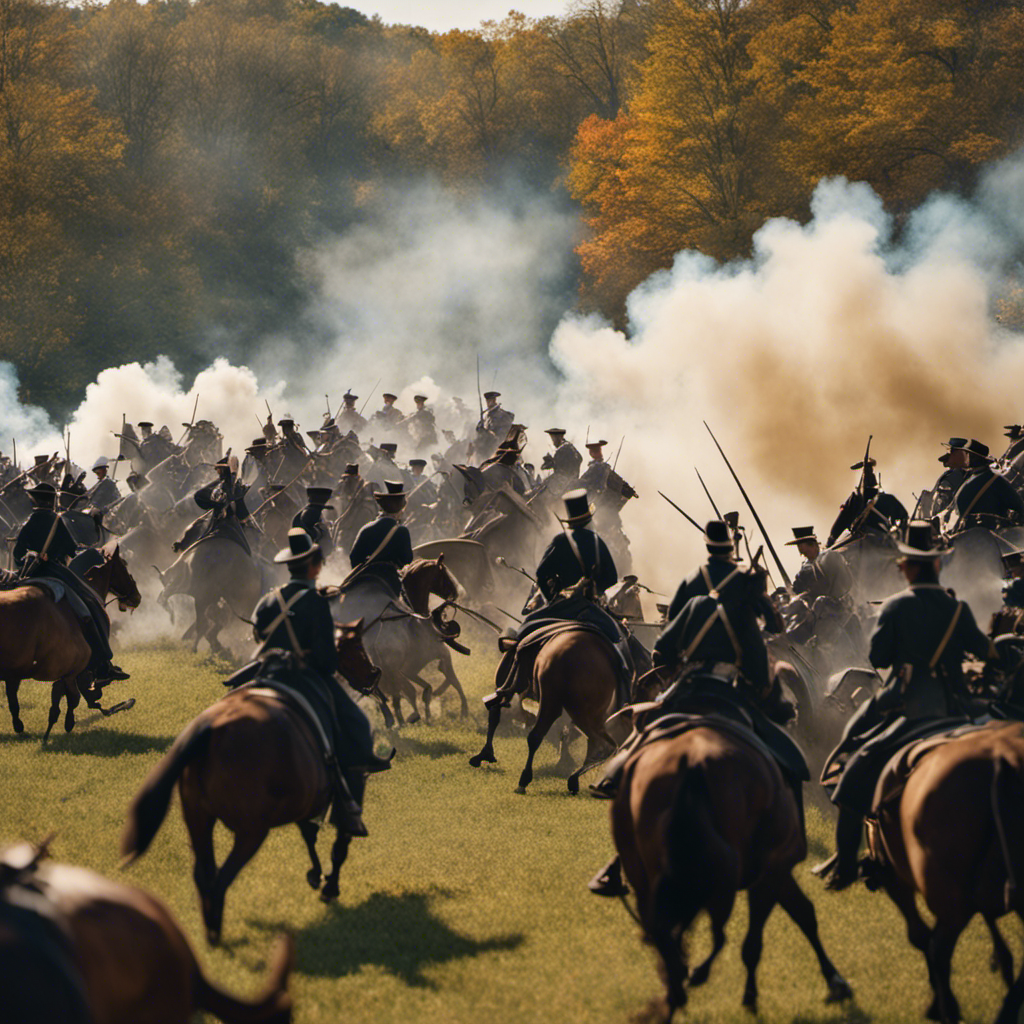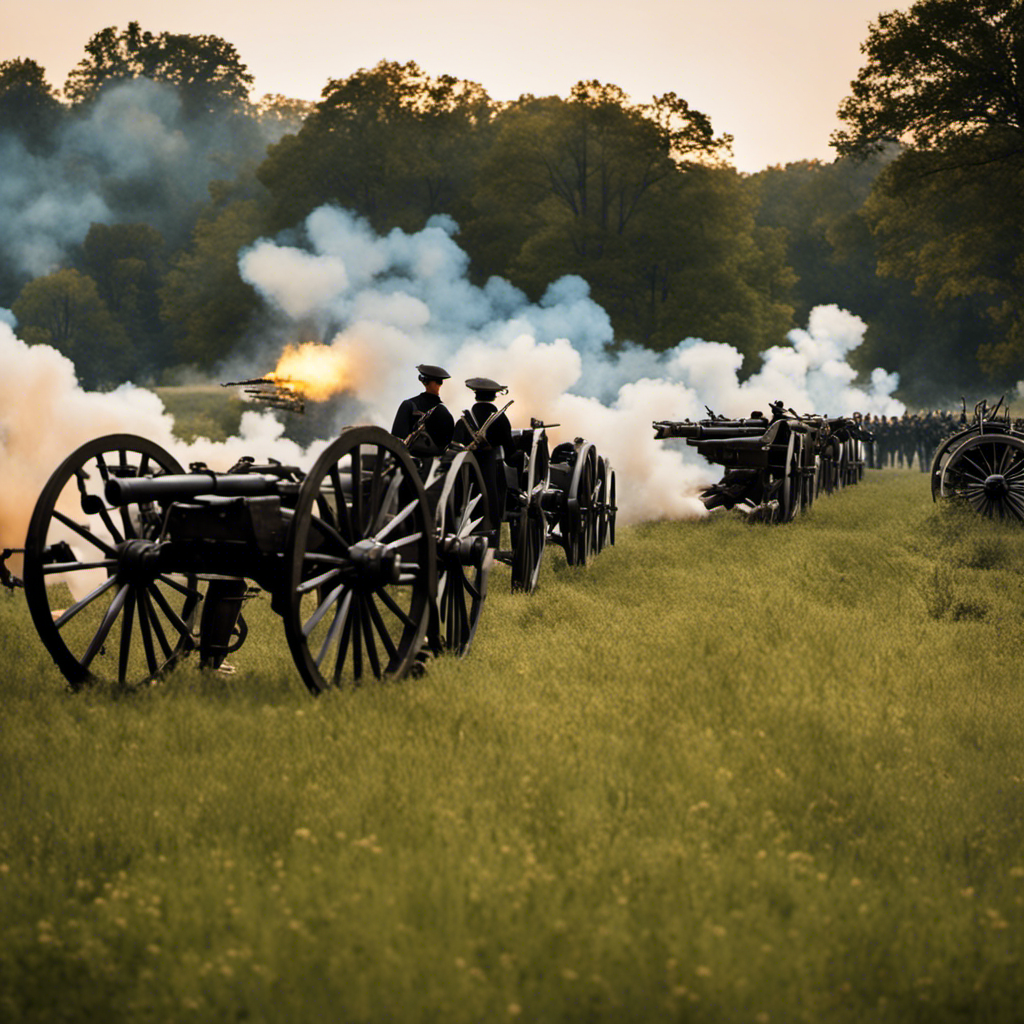Are you ready to dive into the fascinating world of the Battle of Vicksburg? Get ready to uncover some mind-blowing facts about this pivotal moment in history.
From General Ulysses S. Grant’s strategic brilliance to the unconventional food sources during the siege, there’s so much to learn and explore.
Discover why control over the Mississippi River was crucial and how it shaped the legacy of this epic battle.
Join us as we journey through time at Vicksburg National Military Park and uncover valuable lessons from this historic event.
Let’s get started!
Key Takeaways
- The Siege of Vicksburg lasted for 47 days, causing immense suffering for both Union and Confederate forces.
- Soldiers dug underground tunnels for shelter and relied on unconventional food sources like rats and dogs to survive.
- General Ulysses S. Grant’s strategy included the brilliant use of trench warfare, effective coordination of multiple forces, and innovative naval tactics with Admiral David Porter’s fleet.
- The surrender of Vicksburg brought relief for Union troops and civilians, weakened Confederate morale, and marked a significant turning point in the Western theater of the Civil War.
Importance of Vicksburg in the Civil War
Vicksburg played a crucial role in the Civil War. It was a strategic stronghold that the Union couldn’t afford to lose. General Grant devised a strategy to cut off Confederate supplies and control the Mississippi River. After a 47-day siege, Vicksburg surrendered on July 4, 1863. This victory gave the Union full control of the river. It also split the Confederacy in two and secured an important transportation route. The surrender of Vicksburg was a turning point in the war.
Siege of Vicksburg: A Long and Brutal Battle
The siege of Vicksburg lasted for 47 days, causing immense suffering for both the Union and Confederate forces.
To survive, soldiers dug underground tunnels to seek shelter from constant bombardment. These tunnels provided protection and a sense of belonging amidst the chaos.
With food supplies running low, troops resorted to unconventional sources like rats, dogs, and even tree bark to sustain themselves.
The battle was relentless, but their determination in finding creative solutions kept them going.
General Ulysses S. Grant’s Strategy
To understand General Ulysses S. Grant’s strategy, you need to examine his tactical decisions and how they influenced the outcome of the siege. Here are four key aspects of Grant’s tactics and leadership that played a crucial role in the Battle of Vicksburg:
- Brilliant use of trench warfare: Grant utilized trenches to protect his troops from Confederate attacks and slowly advanced towards the enemy.
- Unyielding determination: Despite facing numerous setbacks, Grant remained resolute and never gave up on capturing Vicksburg.
- Effective coordination: Grant coordinated multiple forces to attack Vicksburg simultaneously from various directions, overwhelming the Confederate defenses.
- Innovative naval tactics: Grant employed a daring plan involving Admiral David Porter’s fleet to bypass Confederate fortifications by using waterways, thus cutting off their supply lines.
Grant’s tactical brilliance and strong leadership were instrumental in securing victory at Vicksburg, ultimately leading to a turning point in the Civil War.
The Underground Tunnels of Vicksburg
Grant’s use of underground tunnels was a strategic move that allowed his troops to maneuver covertly and gain an advantage over the Confederate forces.
The underground tunnel networks in Vicksburg provided them with a hidden pathway to surprise their enemies and launch attacks from unexpected angles.
These tunnels not only offered protection from enemy fire but also facilitated quick movements, enabling Grant’s troops to outmaneuver the Confederates.
This tactical advantage played a crucial role in the eventual Union victory at Vicksburg.
Unconventional Food Sources During the Siege
You may be surprised to learn about the unconventional food sources soldiers resorted to during the siege of Vicksburg. In their desperate search for sustenance, they had to rely on alternative nourishment. These included rats, dogs, and even tree bark. To give you a better idea of what they ate, here’s a table showcasing some of the unusual items that made it onto their plates:
| Unusual Sustenance | Alternative Nourishment |
|---|---|
| Rats | Dogs |
| Tree Bark |
These brave soldiers endured unimaginable hardships and showed remarkable resilience in finding ways to survive during this difficult time.
The Surrender of Vicksburg
When the Confederate forces surrendered, it marked a turning point in the Civil War. The surrender of Vicksburg had significant consequences for both sides.
For the Union, it meant gaining control of the Mississippi River and cutting off vital supply lines for the Confederacy. The aftermath of surrender brought relief to Union troops and civilians who had endured a long siege.
It also dealt a blow to Confederate morale and weakened their hold on the Western theater of war.
Vicksburg’s Impact on the Outcome of the Civil War
The surrender of Vicksburg had a profound impact on the outcome of the Civil War.
Vicksburg’s strategic significance: Being situated on the Mississippi River, controlling Vicksburg meant controlling crucial supply routes.
Vicksburg’s impact on the Union’s war efforts: With its surrender, the Union gained control of the entire Mississippi River, cutting off Confederate states from vital resources and dividing their forces in two.
This pivotal victory boosted Union morale and marked a turning point in the war.
The Devastation and Destruction of the City
After the intense battle, Vicksburg lay in ruins. The devastation aftermath was overwhelming, leaving the city in a state of despair. Homes and buildings were reduced to rubble, streets were littered with debris, and the once vibrant community was now a ghost town. However, amidst the destruction, hope emerged as rebuilding efforts began. Determined residents came together to restore their beloved city and create a new future for themselves and their community.
| Devastation Aftermath | Rebuilding Efforts |
|---|---|
| Ruined homes | Community unity |
| Debris-filled streets | Restoration |
| Desolate atmosphere | New beginning |
| Ghost town | Hope |
Vicksburg: A Turning Point in the War
In Vicksburg, you’ll understand why it was a turning point in the war. The strategy adopted by both sides played a crucial role in shaping the outcome of the battle.
Here are five key factors that made Vicksburg significant:
- Siege tactics: The Union forces surrounded and cut off supplies to the city, weakening Confederate defenses.
- Control of the Mississippi River: Capturing Vicksburg gave the Union control over this vital waterway, splitting the Confederacy in two.
- Psychological impact: The fall of Vicksburg boosted Union morale and weakened Confederate spirits.
- Shift in military focus: After taking Vicksburg, the Union shifted its attention to other strategic objectives.
- International recognition: The victory at Vicksburg showcased Union military prowess on a global scale.
These factors make it clear why Vicksburg was not just another battle but a pivotal moment that shaped the course of the Civil War.
Famous Figures and Leaders in the Battle
Explore the significant roles played by famous figures and leaders in shaping the outcome of the Battle of Vicksburg.
Famous figures like Ulysses S. Grant and John Pemberton were key players in this important battle. Grant, leading the Union forces, utilized strategic tactics to siege Vicksburg, ultimately leading to its surrender.
On the Confederate side, Pemberton attempted to defend Vicksburg but was ultimately defeated.
These famous figures and leaders played a crucial role in determining the outcome of this pivotal battle.
Life in Vicksburg During the Siege
Life was extremely difficult for the residents of Vicksburg during the siege. The civilian population faced numerous hardships and struggled with daily life. The psychological impact on civilians was severe, leading them to develop survival strategies.
The siege brought about cultural and social changes, impacting the economy as well. Medical challenges were prevalent, and education suffered during this time. Women and children were particularly affected by these harsh conditions, enduring immense hardships alongside their male counterparts.
The Importance of Control over the Mississippi River
As the people of Vicksburg endured the siege, they were constantly reminded of the importance of controlling the Mississippi River. This geographical advantage gave them access to vital trade routes and allowed for economic growth. Without control over this key waterway, the city’s economy suffered greatly. The table below highlights some interesting facts about the economic impact and geographical advantage that came with controlling the Mississippi River during the Battle of Vicksburg.
| Economic Impact | Geographical Advantage |
|---|---|
| Trade routes expanded | Control over key waterway |
| Increased commerce | Access to transportation |
| Growth in industries | Strategic position for defense |
| Boost in employment opportunities | Ability to control supply lines |
| Attraction of investors and entrepreneurs | Importance in regional and national trade |
Understanding these factors helps us appreciate why both sides fought so fiercely for control over this critical river during one of the most significant battles of the Civil War.
The Legacy of the Battle of Vicksburg
The legacy of the Battle of Vicksburg can still be felt today, as it forever changed the course of the Civil War.
This historic battle showcased important Civil War tactics and military strategy.
Vicksburg’s strategic location on the Mississippi River made it a crucial target for both Union and Confederate forces.
The Union’s successful siege and capture of Vicksburg in 1863 not only cut off Confederate supply lines but also split the Confederacy in half, leading to its eventual defeat.
Vicksburg National Military Park: Preserving History
Now that you understand the legacy of the Battle of Vicksburg, let’s delve into how history is preserved at Vicksburg National Military Park.
This park serves as a guardian of artifacts and memories, ensuring they endure for generations to come. Through educational programs, visitors like you can uncover the secrets of this historic battle.
Immerse yourself in the past as you explore exhibits, participate in reenactments, and discover the significance of preserving our nation’s history.
Lessons Learned from the Battle of Vicksburg
By exploring the lessons learned from the Battle of Vicksburg, you can gain a deeper understanding of the impact and consequences of this historic event. One key lesson is the importance of strategic planning. The Union forces under General Grant meticulously planned their approach, using tactics such as trench warfare and siege to ultimately secure victory. This battle taught us that careful planning and execution are crucial in achieving success on the battlefield.
| Lesson Learned | Strategic Planning |
|---|---|
| Importance | Crucial |
| Approach | Meticulous |
| Tactics | Trench warfare |
| Result | Victory |
Frequently Asked Questions
What were some unconventional food sources that soldiers in Vicksburg relied on during the siege?
During the siege of Vicksburg, soldiers relied on unconventional food sources like rats, dogs, and even mule meat. Their resourcefulness and determination helped them survive in difficult circumstances, showcasing their resilience and adaptability.
How did the surrender of Vicksburg affect the outcome of the Civil War?
The surrender of Vicksburg had a significant impact on the outcome of the Civil War. The effects were far-reaching, as it gave the Union control over the Mississippi River and divided the Confederacy in two, ultimately leading to their defeat.
What were some famous figures and leaders involved in the Battle of Vicksburg?
Some famous figures and leaders involved in the Battle of Vicksburg were Union General Ulysses S. Grant, Confederate General John C. Pemberton, and Union Admiral David Dixon Porter. They played crucial roles in the outcome of the battle.
What was life like for civilians in Vicksburg during the siege?
During the siege of Vicksburg, civilians faced immense challenges. However, their resilience and crisis management skills allowed them to adapt and survive. Their bravery in the face of adversity is truly inspiring.
What lessons were learned from the Battle of Vicksburg?
Lessons were learned from the Battle of Vicksburg. Union General Grant employed a strategy of surrounding and besieging the city, teaching the importance of strategic planning and persistence in warfare.
Conclusion
In conclusion, the Battle of Vicksburg was a pivotal moment in the Civil War, with lasting effects on both the Union and Confederate forces. General Ulysses S. Grant’s strategic brilliance and the perseverance of his troops led to a long and brutal siege.
The underground tunnels used by soldiers for protection showcased their resourcefulness and determination. The battle also highlighted the importance of controlling the Mississippi River as a key supply route.
Today, Vicksburg National Military Park stands as a testament to this historic battle, preserving its legacy for future generations to learn from.
